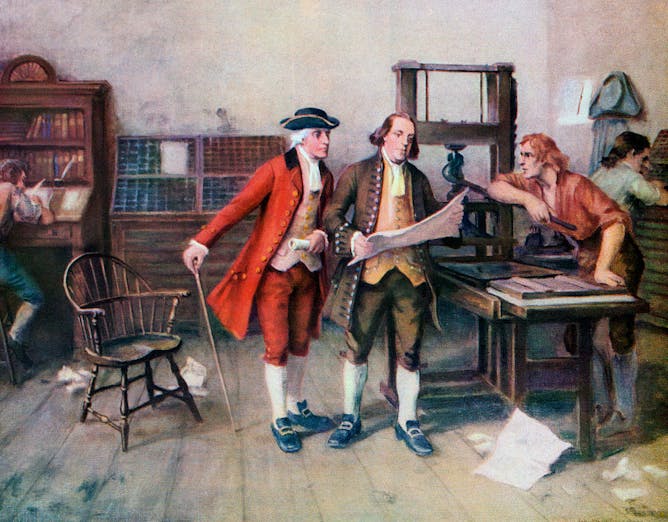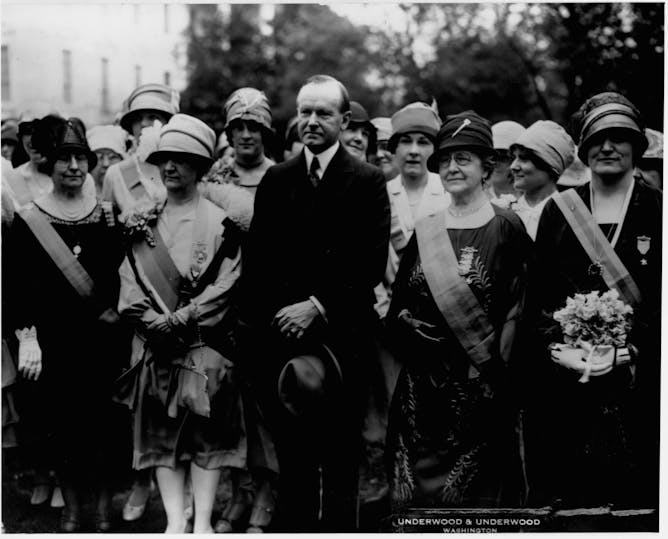|
|
|
|
Welcome to Sunday. The top 5 most-read stories of the week are displayed below. Below that are five editors’ selections that we want to make sure you don’t miss.
You can also get the most-read stories in a magazine-style e-book.
Have a friend or family member who’s gone down the rabbit hole of some conspiracy theory? If, like me, you’ve tried to convince them that they were wrong by plying them with facts and figures, scholar Donovan Schaefer has a reason the strategy probably won’t work: Believing in conspiracy theories is exciting – which is why it’s so hard to break the spell.
Speaking of spellbound, Supreme Court Justice Samuel Alito seemed fixated on the 19th century when he wrote his recent ruling overturning 50 years of constitutionally protected abortion. He cited facts from that era to support his contention that abortion isn’t deeply rooted in American tradition. Yet when the Constitution was ratified in the 18th century, women had much more autonomy over abortion decisions than in the 19th century, according to historian Maurizio Valsania.
And as a runner, I was fascinated by Texas A&M University biologist Shogo Sato’s article on our internal clocks – and when might be the best time to exercise.
|

|
Bryan Keogh
Senior Editor, Economy + Business
|
|
Readers' picks
|

Ben Franklin, center, inserted an abortion recipe in a popular textbook he republished in 1748.
GraphicaArtis/Getty Images
Maurizio Valsania, Università di Torino
A scholar of 18th-century America and the founders analyzes the Supreme Court opinion overturning the constitutional right to abortion, which he says relies on an incomplete version of US history.
|
|
|
-
Shogo Sato, Texas A&M University
Your body follows a circadian rhythm that influences everything from how well your medications work to the best time for exercise.
-
Stella Rouse, University of Maryland; Shibley Telhami, University of Maryland
Researchers found political partisanship is a significant factor in determining perceptions of discrimination against different racial groups.
-
W. Larry Kenney, Penn State; Daniel Vecellio, Penn State; Rachel Cottle, Penn State; S. Tony Wolf, Penn State
New research on young, healthy humans found the body begins overheating when exposed to temperatures and humidity lower than previously believed.
-
Paul L. Morgan, Penn State
ADHD diagnoses are on the rise, a trend that might in part be driven by overdiagnosis. A new study finds that white children are especially likely to be overdiagnosed and overtreated for ADHD.
|
|
Editors' picks
|

President Calvin Coolidge stands with members of a nonprofit group called the Daughters of 1812.
Library of Congress/Corbis/VCG via Getty Images
Chris Lamb, IUPUI
US President Calvin Coolidge hasn’t gone down in history for his triumphs or failures as president during the 1920s – but his dry sense of humor carries on.
|
|
|
-
Donovan Schaefer, University of Pennsylvania
Overcoming conspiracy theories isn’t just about information. A scholar of religion explains that the emotions they inspire are part of their appeal.
-
Jonathan Entin, Case Western Reserve University
When Rosa Parks was arrested for sitting in the front of a bus in Montgomery, Fred Gray was her lawyer. Now he’s being honored for a lifetime of civil rights advocacy.
-
Simon F. Haeder, Texas A&M University
A health policy researcher explains how doctors determine their pay rates, and the system that lets them do it.
-
Svetla Ben-Itzhak, Air University; R. Lincoln Hines, Air University
A comment by Bill Nelson, the NASA administrator, sparked a strong public response from the Chinese government. But due to legal and practical reasons, no country could take over the Moon anytime soon.
Download the new e-book edition
We are providing a magazine version of five stories in this newsletter to read on a tablet, e-reader or on paper. Try it out and reply to this email to tell us what you think.
|
|
|
Like this newsletter? You might be interested in our other weekly emails: About The Conversation: We're a nonprofit news organization dedicated to helping academic experts share ideas with the public. We can give away our articles thanks to the help of foundations, universities and readers like you. Donate now to support research-based journalism
|
| |
| |
| |
| |
|
|
|
|
|
|
|